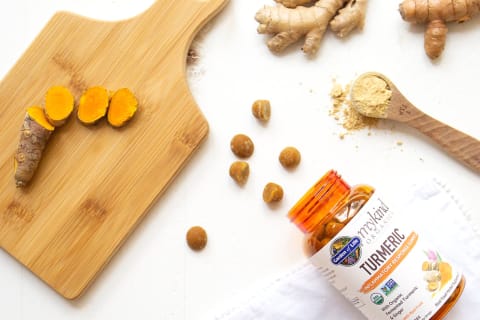Advertisement

Unless you’ve been on a very, very long technology and social media detox, you probably know a thing or two about the benefits of turmeric. A member of the ginger family, turmeric and its main anti-inflammatory compounds, called curcuminoids, have been used in Ayurvedic medicine—an ancient medicine system originating in India—for their many healing benefits for thousands of years.
But how much do you really know about turmeric? You might know that it's a popular spice and that it has some pretty famous anti-inflammatory and antioxidant benefits. You also likely know that it can be used to make all kinds of foods (green curry, anyone?) and drinks (pass the golden milk, please). What you might not know, however, is that sprinkling a little bit of turmeric into your daily routine here and there might not be enough. So if you want to get the full benefits of this ancient spice, read on.
This is how much turmeric you really need to be taking.
The amount of turmeric you really need depends on your individual health goals. Are you looking to promote a healthy inflammatory response? Maintain optimal gut health? Temporarily relieve minor aches and pains? The intention behind your supplementing matters. An acceptable daily intake for general health is around 1.4 mg per pound of body weight, according to the World Health Organization. But to treat specific needs, doses up to 2,000 mg per day over a several-month period have been shown to be effective. In India, people consume around one teaspoon of turmeric as curry powder (4,000 mg) on a daily basis!
So, how can you get the benefits of turmeric without consuming pounds of curry powder? Well, the clean extraction of the curcuminoids is key. While it is standard to use solvents (such as hexane from petroleum) or alcohols (such as ethanol) to extract the beneficial curcuminoids, Garden of Life uses a unique, clean and organic extraction process to deliver a 95% extract of organic curcumin in their new mykind Organics turmeric products without using solvents.
For example, mykind Organics Extra Strength Turmeric, which is designed to support healthy inflammatory function†, delivers 100 mg curcumin from an organic turmeric blend – just one tablet provides the equivalent of a teaspoon of turmeric powder. On the other hand, their Pain Relief Formula combines 50mg curcumin with 300 mg of organic Paractin® (a specific form of andrographis extract) for temporary relief of minor aches and pains.† Both formulas use Non-GMO Project Verified, Certified Organic fermented turmeric and also contain ginger root, black pepper extract, and probiotics—all ingredients that help boost digestion and absorption for efficacy. Always be sure to check with your doctor when figuring out what dosage would be beneficial for you.
The science of supplements isn’t a simple one. Dosage matters, the form of the nutrient matters, and what it’s combined with really matters. In the case of turmeric, it should be combined with black pepper, which studies have shown increases its bioavailability exponentially.

How to find a turmeric supplement that really fits your needs.
Finding the right dose of turmeric is one thing, but it's also important to find a supplement that you can (and actually will!) easily incorporate into your daily routine. Let’s be honest: there are a lot of options out there, and it can be hard to choose. If you’re not going to make a cup of golden milk every night or take a potent herbal tincture with water before bed because you don’t love the taste, know yourself and respect that you should keep it as simple as possible. If you know you’ll look forward to a sweet gummy vitamin after lunch at work, keep that bottle of mykind Organics Turmeric Inflammatory Response Gummy right on your desk (bonus: it tastes like apple pie).
It's important to pick a supplement that you’ll actually take, or you’ll end up with the famous cabinet in your home filled with half-filled supplement bottles that just didn’t fit into your routine. So ask yourself: are you a simple supplement capsule minimalist, nighttime golden milk person, or a gummy vitamin connoisseur?
Quality control: exactly what to look for in a turmeric supplement.
When you’re looking for a turmeric supplement (or any supplement for that matter), make sure you’re buying from a brand you can trust—one that’s sourcing their ingredients responsibly and has your health top of mind. It’s a huge bonus if they are tested by a third party for quality and safety. It’s why we recommend Garden of Life’s turmeric supplements: They’re Certified USDA Organic, Non-GMO Project Verified, Certified Gluten Free by NSF, and Certified Vegan and Kosher, so you know you can trust what’s inside.
So there you have it! Now you know the ins and outs of turmeric and how to track down a turmeric supplement that will give you all of the benefits you want—in a form that makes sense for your lifestyle.
